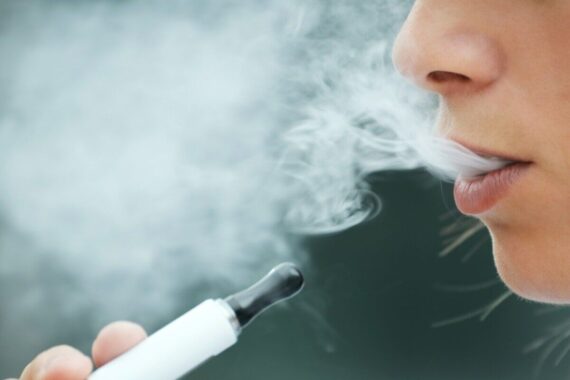The Government will ban disposable vapes and restrict flavours marketed at children as part of efforts to combat youth vaping across the UK.
In his announcement today, the Prime Minister also reiterated his commitment to creating a ‘smoke-free generation’ by promising to bring forward legislation ‘at the earliest opportunity’ to ban the sale of tobacco to children turning 15 this year or younger.
The new measures on vaping also aim to stop manufacturers using ‘visually appealing’ packaging and stop shops displaying vapes close to products such as sweets.
There will be new fines in England and Wales for shops which sell vapes illegally to children, with the authorities permitted to ‘act on the spot’.
The UK, Scottish, and Welsh Governments will all introduce legislation banning the sale and supply of disposable vapes, while in Northern Ireland officials have said they will consider potential future legislation.
In October last year, the Government ran a consultation on smoking and vaping which found ‘overwhelming support’ for a disposable vape ban, with nearly 70% of respondents, including healthcare professionals, agreeing with the new measure.
Some respondents suggested that vapes should be accessed by prescription only – the Government confirmed there are ‘no current plans to do this’ but the Medicines and Healthcare products Regulatory Agency (MHRA) is ready to support a future ‘medicinally-licensed’ product.
The proportion of 11 to 17-year-old vapers who use disposables has increased almost ninefold in the last two years, according to the Government.
Meanwhile, the number of children vaping in the past three years has tripled, and 9% of 11 to 15-year-olds now use vapes.
Prime Minister Rishi Sunak said that while vaping ‘can be a useful tool to help smokers quit’, the marketing of vapes to children is ‘not acceptable’.
‘As any parent or teacher knows, one of the most worrying trends at the moment is the rise in vaping among children, and so we must act before it becomes endemic,’ he said.
And Government figures showed that vapes contribute up to 70,000 additional smoking quits a year in England.
However, the Government has highlighted today that the long-term health impacts of vaping are ‘unknown’ and that withdrawal from the ‘highly addictive’ nicotine contained within them can cause ‘anxiety, trouble concentrating and headaches’.
Health secretary Victoria Atkins said smoking remains ‘the single largest preventable cause of death in England’ and it ‘costs society £17bn each year’.
She added: ‘That’s why we are driving the way forward through our smoke-free generation plan, which will prevent our children from starting this dangerous habit.
‘The health advice is clear, vapes should only ever be used as a tool to quit smoking. But we are committed to doing more to protect our children from illicit underage vaping, and by banning disposable vapes we’re preventing children from becoming hooked for life.’
The Royal College of Paediatrics and Child Health (RCPCH) vice president for policy Dr Mike McKean said the college is ‘delighted’ with the Government’s new measures, and the ban on disposable vapes is ‘a meaningful step in the right direction’.
‘As a respiratory consultant it is not lost on me that smoking remains the single biggest cause of preventable illness and disease in the UK. We know this because we have 60 plus years of research and data on cigarette use on a population level,’ he added.
Some experts expressed concern that a ban on disposable vapes could discourage smokers who are trying to quit.
Director of the Tobacco and Alcohol Research Group at UCL Professor Jamie Brown said there is a ‘clear need for action to reduce disposable vaping among young people who have never smoked’, but that ‘trade-offs need to be carefully considered’.
He warned: ‘This ban may discourage use of e-cigarettes among people trying to quit smoking and induce relapse among those who have already used disposables to quit.
‘Cigarettes are far more harmful to our health and are not currently banned for adults. A ban on disposable e-cigarettes may signal to large numbers of people that these products are worse for our health or that their harm is comparable to that caused by smoking tobacco.’
Professor Caitlin Notley, professor of addiction sciences at the University of East Anglia, said the upcoming legislation to create a smoke-free generation is a ‘progressive policy’ and the Government ‘must remain focused’ on these efforts.
She said: ‘The banning of disposable vapes is also intended to prevent young people from starting to use nicotine.
‘Whilst we all agree that it is important to protect children, I think it is vital that we focus less on the vaping ban and more on wiping out tobacco from our population, as this is what will have the greatest impact on population health.’
In 2022, a damning review led by Dr Javed Khan had backed England following in the footsteps of New Zealand, and recommended ‘increasing the age of sale from 18, by one year, every year until no-one can buy a tobacco product in this country’.
Last month, a study funded by Cancer Research UK claimed that decades of progress made in cutting the number of people who smoke has ground to a halt since the pandemic.

















